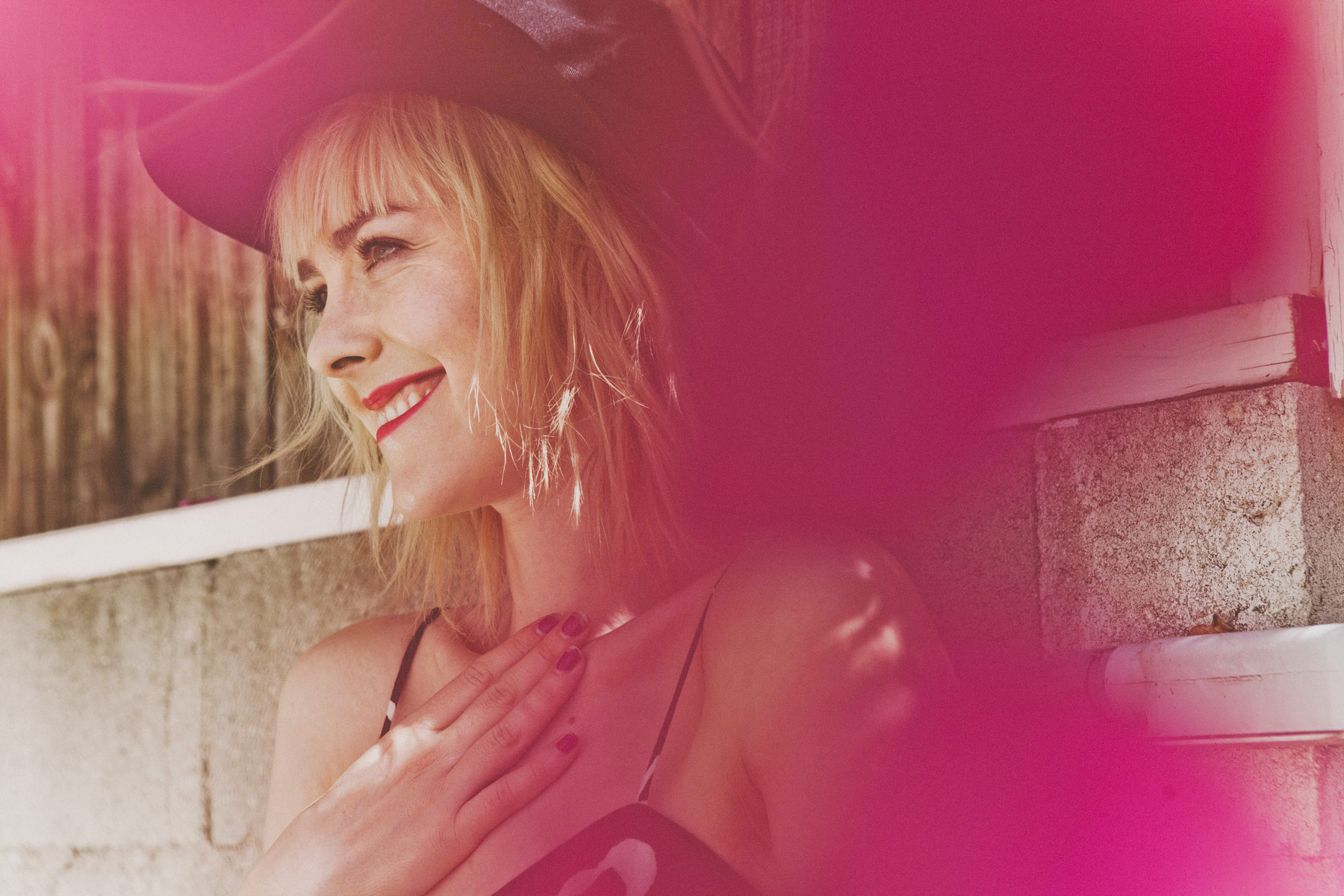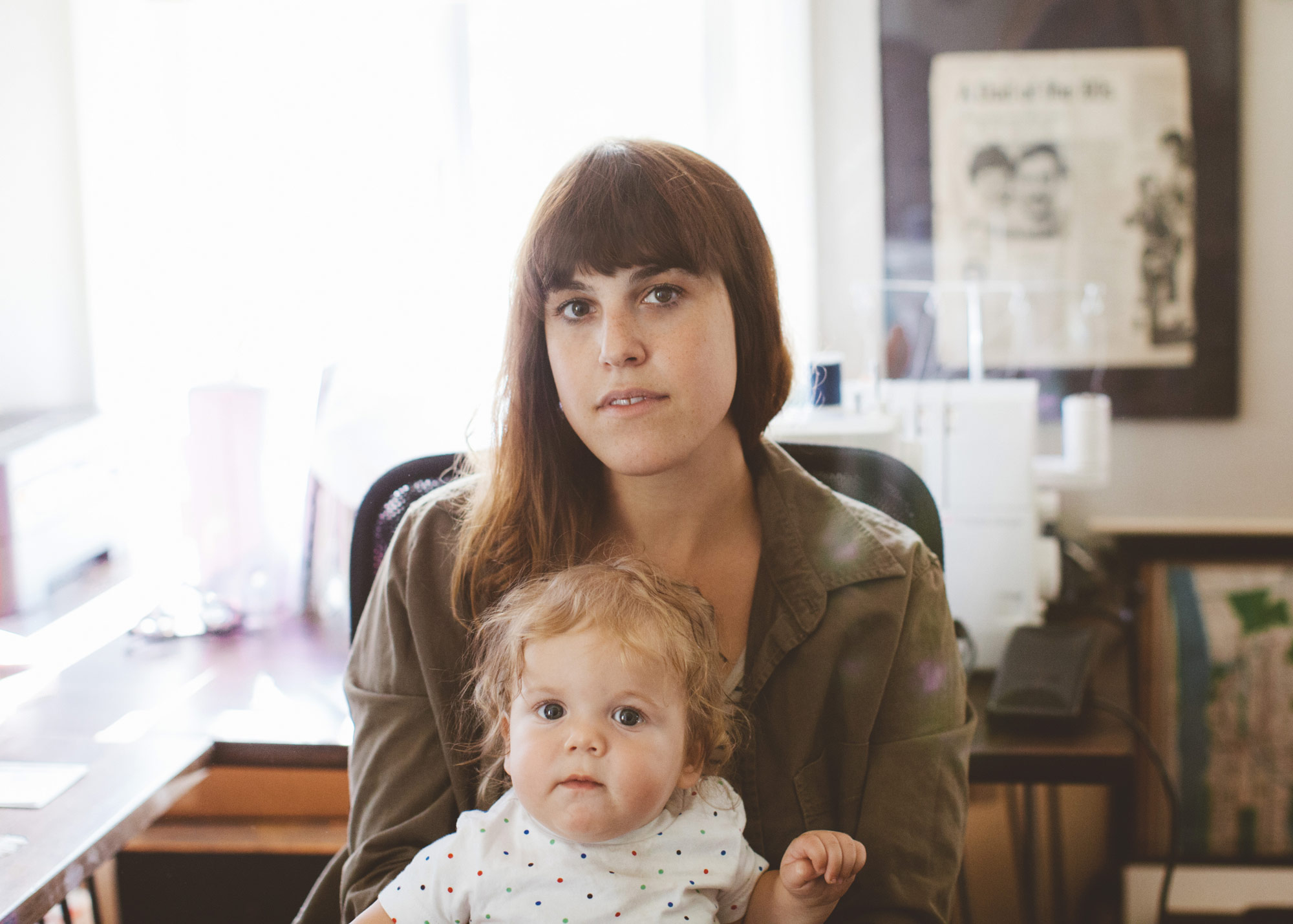
- Interview by Tina Essmaker August 26, 2014
- Photo by Abigail Weinberg
Elizabeth Weinberg
- photographer
Elizabeth Weinberg lives and works in Los Angeles. In 2010, she was selected as one of PDN’s 30 Emerging Photographers to watch. In 2011, she was named an Art Directors Club Young Gun. Her work has been featured in American Photography 26 and 27.
Tina: Describe your path to becoming a photographer.
I got my first camera when I was a kid, and I always took photos for fun when I was in high school, but it never crossed my mind to pursue it as a career. I initially chose graphic design as a career because I was into computers and art. I went to college at Boston University’s College of Fine Arts. One day, I was browsing the school’s website and saw that they had a photojournalism major, but it was in the communications program. Boston University (BU) didn’t have a BFA photography program like a lot of art schools do; their art school only had majors offered in painting, sculpture, and graphic design.
After my freshman year, I decided to transfer to BU’s College of Communication. That meant I had to take a summer class and put up with a bunch of bureaucratic stuff, but I really wanted to stay at BU. From then on, I was a photojournalism major. That’s when I started doing a lot of basic stuff: learning to scan negatives, develop film in a darkroom. It was the early 2000s when people were still shooting with 35mm cameras and the digital cameras that were out were ones like the Nikon D1x, which was 4 megapixels. But that’s what all the newspaper people were using, so that’s what I used. I was just looking back at some of the files I shot in college, and they’re so bad. (laughing) We were being groomed to be newspaper photographers, so we had to shoot sports and spot news; I wasn’t interested in that at all. I wanted to shoot musicians and portraits of my friends, and be more creative with it.
I ended up doing independent study, which was cool. I worked on my own stuff, spent time in the lab, rented a lot of gear to shoot with, and taught kids how develop film and print. It was crazy because, as a student, I got free film processing. I could send color film out to get processed for free at a lab in Boston, where I worked later on. During school, I worked for BU’s newspaper, the Daily Free Press. I actually just found myself listed on their Wikipedia page as a notable alumni, which cracked me up. (laughing) I convinced the paper to let me shoot shows and music stuff. And that was school.
What degree did you graduate with?
I graduated in 2004 with a Bachelor’s of Science in journalism with a concentration in photography. I moved to New York City in 2005, where I worked at The Small Darkroom, a small, high-end photo lab. Upstairs was a digital department called Picturehouse, which I believe is still in operation. This was a really good experience because I was the front desk person, so I took in all of the film from photographers who were just starting out in 2005, like Cass Bird and Jason Nocito. Photographers were bringing in tubs of wet Polaroid 665 negatives with work for magazines like The FADER and Paper. I met a lot of people, dealt with agents, and had a real experience with the New York photo scene. And, because I worked there, I also got free film developing, which was insane. That’s where I learned to print color really well.
I worked at the photo lab for a year, and then I was a studio manager for a year. Meanwhile, I was shooting my own work as well as promo photos for musician friends, who I had met in college when I worked for a music management company.
Although I did the studio managing job for a year, I hated it. I was miserable working for someone else. I quit that job and started doing—what was I doing?! Oh, yeah, I was unemployed for a whole summer and was so poor. It was 2007, and I had a blog and a web presence, but you couldn’t build a career from just that. This was before Tumblr and Instagram, when you still had to do things organically. I started working part-time as a photo editor for Time online, and I had a deal with my boss that if I had a shoot, I could leave. That was helpful because I started getting more editorial assignments here and there for clients like Nylon and CMJ. I wanted to shoot anything; I didn’t care if I got paid because I needed to build my book. I had nothing, except photos of my friends.
I had web development experience and, in 2008, I started taking on smaller jobs doing that for three or four days a week. That let me pay rent in New York and gave me free days to go to meetings or shoot. I did that for a few years as things started snowballing.
In 2010, I finally went freelance for good.
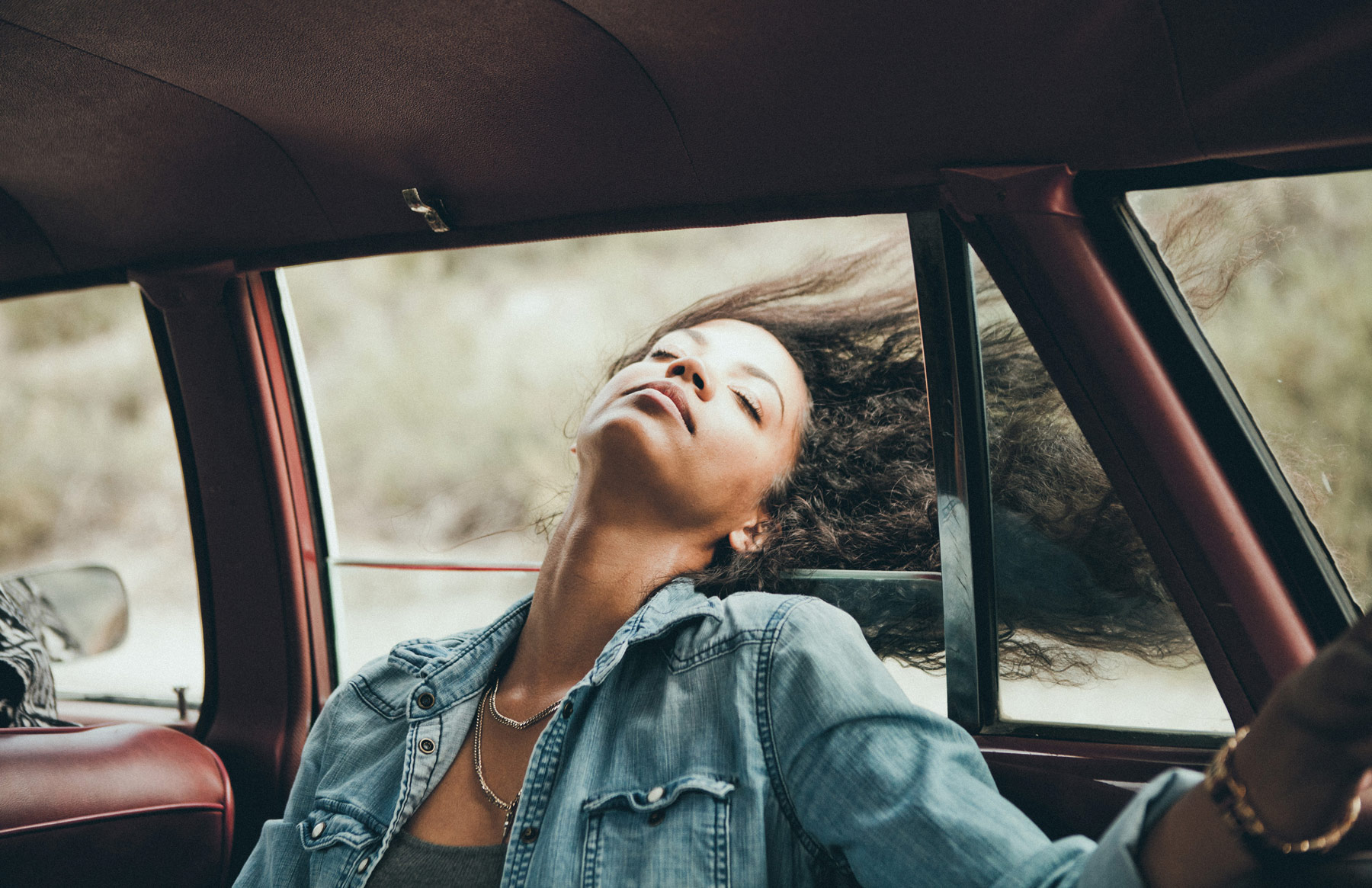
“I got my first camera when I was a kid, and I always took photos for fun…but it never crossed my mind to pursue it as a career. I initially chose graphic design…because I was into computers and art.”
How was the transition from doing part-time work to supporting yourself being a full-time photographer?
I was so broke. I was not the best with money, and I’m still not. I had a crazy amount of credit card debt. I lucked out by getting this really big ad job in 2009, which helped me clear all my credit card debt. It sucked because I also needed to buy a DSLR, and I hoped that money would come back to me; it did, but it was terrifying. I didn’t know if I was going to be able to pay my rent and I was not moving back in with my parents.
After I did that big ad job, nothing like that came along again until a year later in 2010. That was when I was included in the PDN 30, and I got my first agent. I thought, “Okay, I have to throw myself into this 100%.” I knew it was time. It took me a long time, though, because I didn’t feel comfortable letting go of that part-time job. I didn’t have a trust fund or parents who were willing to pay my rent.
And at some point you moved from New York to LA. What kind of work are you doing right now?
I moved here at the end of 2012. I was always out here shooting, and my work is generally shot in natural light, which is awesome out here. Plus, my husband and I wanted to have a kid and buy a house, which is very hard to do in New York. And I was kind of over it—I’d lived in New York for almost eight years.
Right now, I’m focusing on advertising. It’s funny, but I’ve been shooting editorial celebrity stuff, which I didn’t expect. In April, I lost a job because I didn’t have any celebrities in my book. The day I was supposed to shoot the job that I got nixed on, I got the opportunity to shoot Joaquin Phoenix for the New York Times. Whoa! One, I had come full-circle with my degree because I had never shot for a newspaper before, and, two, that’s pretty much the epitome of celebrity. Since then, I’ve been shooting regularly for the Times because I get really great subject matter, which allows me to shoot for other magazines. Once you have one or two big-name people in your book, a door opens.
Yeah, people definitely begin to trust you more.
Totally. And I’m really fast when I shoot them, which they love. I don’t overshoot because that’s not my style, and I don’t need a ton of time to set up. It’s usually just me—no lights or anything.
So, yeah, I’ve been doing that. I also just did a test shoot with kids because I’d like to do more advertising work with them.
Have you been traveling for work at all?
I haven’t traveled for work since I had my son, Oscar, who is now nine months. It actually hasn’t come up. I don’t know if photo editors just figure I don’t want to leave? A lot of it is that I’m now here in LA and photo editors know that, so they find existing jobs for me here.
We are going to New York in a few weeks, though. I have a bunch of meetings and am looking for a new agent. I haven’t been traveling much this year, but now that my son is older, I will.
Where did you grow up? Was creativity part of your childhood?
I grew up in a suburb outside of Boston, in Franklin, Massachusetts. I was always, drawing, making stuff, crafting. My youngest sister was born when I was 15, and I began shooting portraits of her, which is what started my documenting of things. I got my first 35mm camera for my eighteenth birthday. My friend taught me the basics of exposure and F-stops, and I was super into it. I’d drive to CVS and pick up my negatives; I have boxes and boxes of them. I have so many photo albums. That was the catalyst for me, but the switch didn’t flip on in my head that it was something I could get paid for until later.
Did you actually have an “Aha!” moment when you knew that photography was something you wanted to focus on?
I think the “Aha!” moment was when I switched to being a photojournalism major, but I still didn’t have any clue what it took to make a living as a photographer. I wasn’t thinking past the next year of college. I had no idea how to jump from being a graduate with a degree to working. Now, there are so many resources online and the barrier to entry is lower, but in 2004, I had no idea what to do. It took working at the photo lab in New York to realize that people were making money. I wanted to do that, too.
Have you had any mentors along the way?
It’s weird. I feel like I went at it alone. I never assisted, and I was only a studio manager for a year, so I never had a constant mentor/mentee relationship with anyone.
Now, because of the Internet, people email me with questions, and I’ve found myself in that role, which I like. But not having those opportunities when I was in that position, and not actually assisting anyone left me to only have my peers as people to bounce ideas off of. Working as a studio manager, I didn’t want to inject my aspirations into the job, so I didn’t want to bother my boss with questions about how to get ahead, because I wasn’t there to do that; I was there to help him. I think it was a pretty solitary process for me, but now I really enjoy teaching and talking to kids who are younger.
Have you taken any big risks to move forward?
Going full-time freelance was definitely a risk that I had been putting off, and leaving my first agent and signing with a new one was another.
Moving to LA was a big risk; it was crazy. My husband and I came out here, possibly looking to move. We found a house we really liked and put an offer in the next day because we had to—there were already counteroffers on it. We got approved, closed on it, and moved. It all happened within a span of five weeks, from flying here to look and actually moving here in a big truck.
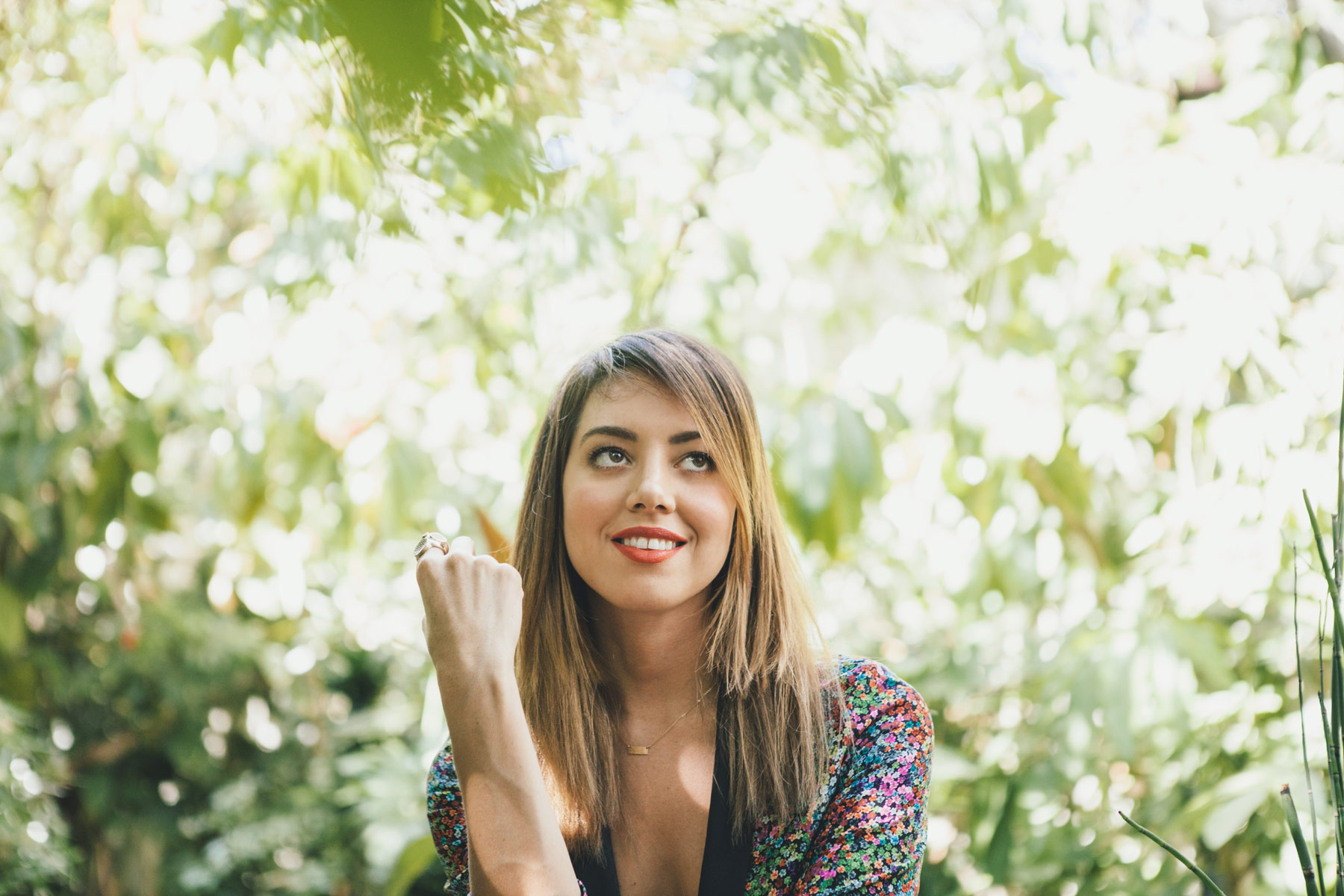
“A lot of women are aware of the negative connotations we can have when we’re outspoken. Even on set, if you take charge and have your shit together, it can be viewed in a negative light, which is an insane double standard.”
Did you drive across the country?
(laughing) Yeah. It was over Thanksgiving so the movers weren’t working, and we would’ve been without our stuff for over a week. Plus we have a dachshund and two cats. We drove a 26-foot Penske truck five days, 12 hours each day. It was insane! But we made it.
That was a risk, especially because I had a large client base in New York, but I had always wanted to live on the West Coast. It’ll be two years in November, and I’m finally feeling the groove of being in the city, working with clients here, and being part of the creative community. Shooting out here is so much better! You don’t have to lug your stuff on the subway, and the light out here is something you can’t find anywhere else.
Are your family and friends supportive of what you do?
Yeah. It was funny because getting into the small art school within BU was really hard; it was a tiny program, and I had to go through a portfolio review. When I told my dad I was switching to communications, he said, “You spent all this time getting into this super-exclusive thing,” but I really wanted to do it. I actually followed in his footsteps without knowing it; he and my mom were both newspaper journalists when they met.
And my friends are totally supportive. They love that I can capture the crazy things they do!
Do you feel a responsibility to contribute to something bigger?
I think so, but it’s hard to know exactly what that is. I enjoy talking to young photographers who are starting out. I’m doing photo Field Trip in March 2015 and will be teaching a class there. I’m not sure what it’s going to be yet, but my desire is to teach color processing, which I get asked about constantly. Because I didn’t have those opportunities, I want to be a vocal part of it now.
The other thing I like is advocating for women in photography because I think it’s a really sexist industry. A lot of women are aware of the negative connotations we can have when we’re outspoken. Even on set, if you take charge and have your shit together, it can be viewed in a negative light, which is an insane double standard. I’m not shy about talking about those sorts of things. I try to be an advocate for women because I think it’s super important. Those are the things I fight for.
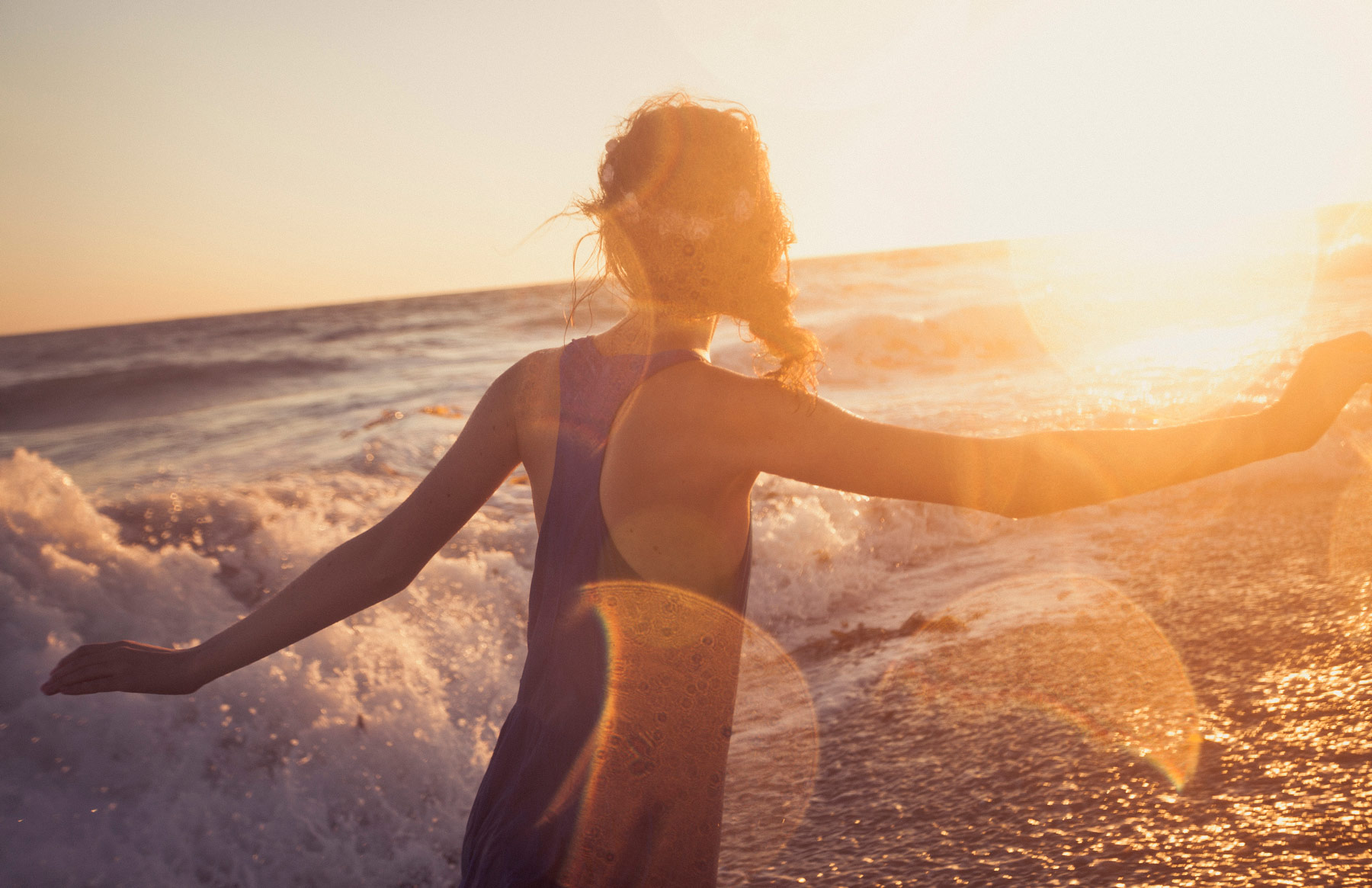
Are you creatively satisfied?
After having a baby, photography was on the back burner for a couple of months. Now, I’m back into being hungry to work all the time. When work isn’t feeding that hunger, I’ll do a personal shoot. I just did one with a bunch of kids, which I called All Summer in a Day. The idea came to me while I was driving after having In-N-Out Burger. (laughing) I remember it very clearly. When I have those pangs of creativity that I want to express, I’ll do a test shoot. That was actually really successful; it got put on BOOOOOOOM! and a some other blogs. I’m also making a little book out of the shoot.
Now that my son is older, I’m able to produce shoots that are creatively fulfilling to me and also help add work to my portfolio. I think that’s really important because things can get stale and you want new work to show to people. It’s been good to be in LA where I can assemble an awesome team. I know so many people out here who do great work, which makes it much easier to realize a vision.
Where do you see yourself in the next few years?
I really want to bring some motion ideas to life. I want to assemble a good team of DPs, colorists, and sound people. I have dreams of making music videos or bringing some of the still stuff I’ve shot to life in a way that fits my style—that cinematic, real vibe—but it’s daunting. When you’re shooting, you are directing, but calling yourself a director is an entirely different thing. I also like the instant gratification of being able to do a shoot and put the images up the next day; video is a much slower process. I almost feel like I’m back to where I was when I started in photography and didn’t know how to break in. A lot of photographers just go and do it, but I’m still navigating how I want to approach it. I feel like I just need a client to say they’ll take a risk on me to direct something, and then once I have that one thing, I’ll be in. That’s one of my goals for the next few years.
Other than that, I want to do more of the same. I’ll look at old work and think my new work is better, but I want to continue getting better, working for cool clients, and shooting interesting people. It sounds very cliché, but you can always shoot more and do bigger projects.
What advice would you give to someone starting out?
It’s so, so important to be visible online because the lifespan of what you post is condensed down to days instead of weeks and months, especially because people are ingesting so much content. Create things all the time and post work on Tumblr, Instagram, wherever. Submit work to good art blogs, because that’s how people will find you. I have a European agent who found me on a photo blog where a friend of theirs posted my photos. It’s all about that now.
Meeting people and networking is also important. Go to openings and be a nice person—that always helps! (laughing) Join your local community of artists. Here in LA, there’s a camaraderie that comes from that; we pass work on to each other and help each other out.
Oh, and get an accountant and keep good track of your finances, even if it seems like you’re not making any money. It’s easier to be organized from the start rather than trying to go back and organize a massive amount of receipts, like this pile I have here—but I have a receipt scanner, so I’ll scan them in later. Treating your passion as an actual business from the beginning is a good habit to get into. When it grows, you’ll already have a system.
“…get an accountant and keep good track of your finances even if it seems like you’re not making any money…Treating your passion as an actual business from the beginning is a good habit to get into. When it grows, you’ll already have a system.”
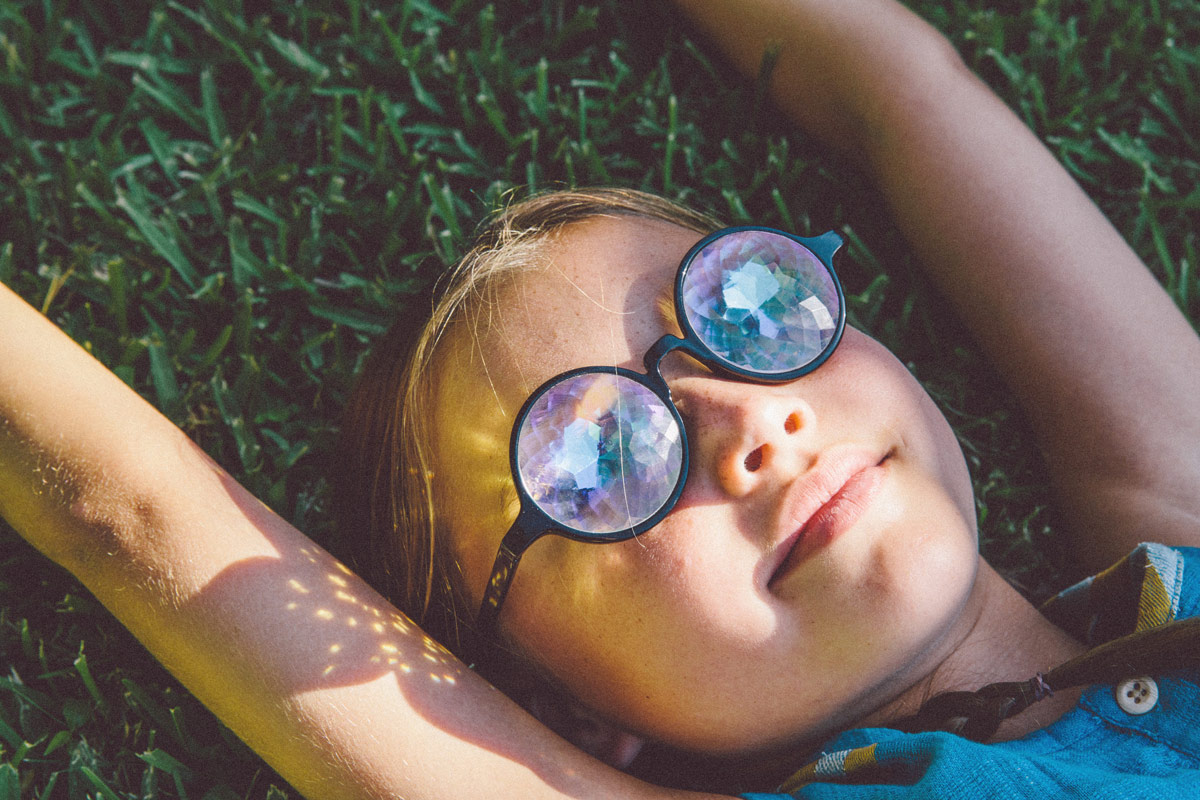
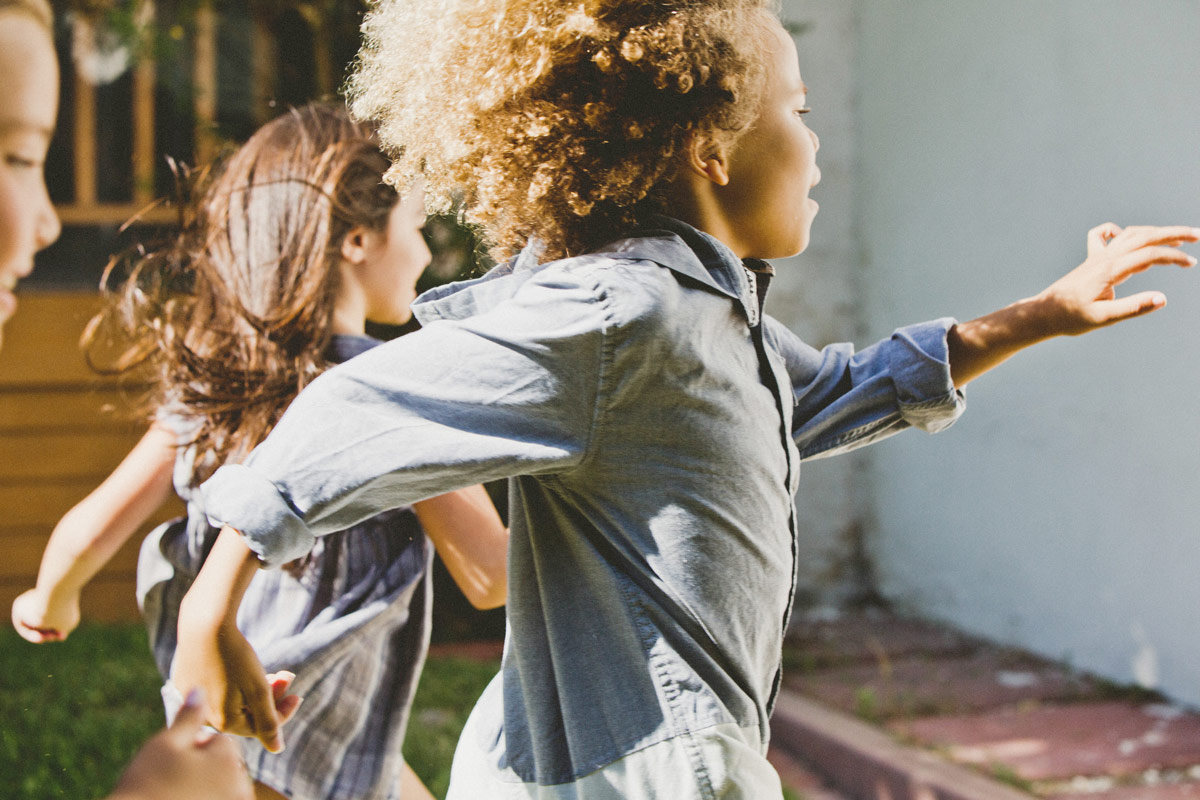
How does where you live influence your creativity? I’d also be interested to know how New York influenced your work versus how LA currently does.
That’s a really good question. New York influenced my work in a completely different way than living in LA does. I think there’s a lot more day-to-day stress in New York, because that’s just the way it is. You constantly feel anxious. I kind of like the energy that accompanies having so many things going on at once. Personally, that makes me feel more ambitious because there’s so much going on and I want to make things happen.
At the same time, New York winters lasted five months and it was freezing and dark. For half of the year, I couldn’t shoot anything I really wanted to shoot; summer is my time. Sometimes the cold and darkness can bring you down, and you don’t want to do anything. I’m sensitive to the amount of sunlight I get—I mean, as I’m looking through the window right now, there’s a hummingbird outside.
I think I see some pigeons outside my window. (laughing)
The amount of creative energy I felt in New York wasn’t enough to make up for winter and the expense and the stress of living there. There is a lot to do there, but it’s not the same as it is here when it comes to photo peers; I feel like there’s slightly more of a competitive dog eat dog kind of thing going on with New York because that’s the nature of the city. The camaraderie I have with my creative friends out here is more palpable. There are highs and lows in any career, but the lows were a lot lower in New York.
In LA, it’s sunny all the time and I can shoot year round. If I want to do a shoot in the mountains with snow, I can drive 25 minutes north; if I want to go to the beach, it’s about an hour away; and then there’s the desert, too. If you want to get out of New York and want to go upstate, you’re stuck in traffic for an hour before you even get out of the city; you feel trapped. In LA, I feel like I can create more easily because of the weather and the lower day to day stress level. It’s inspiring to just exist here.
That said, is it important to you to be part of a creative community of people?
Yeah. In Brooklyn, I had my office in my apartment and I felt really isolated all the time, mostly because I didn’t have many friends who were freelancers. Most of them had full-time jobs. I felt like a weird outsider. Here, there is plenty of outdoor space and it’s easier to get around and see people. It’s physically easier because you’re not cramming into the train, it’s more pleasant, you’re not bummed out by the weather, and it’s not overcrowded. Everyone seems more accessible here. People are in a better mood, and nicer.
Do you have a community that you get together with regularly?
It’s funny you asked. I’m now part of this monthly women’s photography group. We’ve been meeting since April, and I look forward to it every month. We show work that we’ve done, set goals, and hold each other accountable. It’s helpful because we give each other feedback; it’s hard to be objective with your own work and having other sets of eyes is good. We share resources, too, especially because there’s kind of a boys’ club mentality in the photography world.
Our group doesn’t have a name yet, but we’re trying to come up with one. We’re expanding slightly and thinking about doing a group show. This little community of women has been great.
What does a typical day look like for you?
It’s interesting being a freelancer and having a kid. It’s definitely an adjustment because your time is not your own anymore. My days have changed considerably. I am not an early riser, but, thankfully, my child is a really good sleeper. He usually wakes up around 8am, I feed him, and then he naps from 9am to whenever. If I have a shoot, I’ll drop Oscar off at my friend’s house—she’s a nanny—or sometimes she’ll come over here. Can you see this playpen behind me? If I have to, I’ll work on the computer during the day and let Oscar play behind me. We do that in bursts throughout the day if I’m not shooting. I have so many friends who are freelancers, so I often try to meet up with them for lunch and bring Oscar with me. In the afternoon, we go to a local children’s museum where there’s an early childhood play area. Oscar takes another nap in the afternoon and my husband, who also works from home, usually takes him for a walk around 6pm. By 8pm, Oscar is in bed and I’ll work on the computer until I go to bed. I have a weird reverse schedule for now, until Oscar goes to preschool. Then I’ll hopefully work more normal hours.
What music are you listening to right now?
I’ve been listening to The War on Drugs’ new album, Lost in the Dream.
Any favorite movies or TV shows?
I can’t go to the movies ever. The last movie I saw in theaters was Her, but we had to leave; I thought Oscar would sleep, but there were a lot of quiet parts in that movie and he was making noise. Unfortunately, I haven’t been back to the theater.
I don’t watch that much TV, but I did watch True Detective, which was really good. We’ve also been watching The Leftovers. I don’t actually enjoy watching it, but I feel like I have to watch it. I can’t stop.
Ryan and I feel the same.
I never watched Game of Thrones until this past spring. I started from the beginning and watched it all the way through. Now I’m all caught up.
Other than that, I haven’t had much time to watch TV. Now that I have that chance to work when Oscar goes to sleep, I don’t want to spend it in front of the TV. I’d rather be productive.
Do you have a favorite book?
Oh, man! All the free time I have is spent working or exercising, so I haven’t read much. As far as photography books, I never got into them—maybe because I felt bad spending the money? There are a few I’ll splurge on, like Cass Bird’s book and Daniel Shea’s book, Blisner, IL. I’m mostly into when people self-publish stuff and I’ll buy their zines. I supported the new Mossless Issue 3 on Kickstarter and Sara Cwynar’s Kitsch Encyclopedia.
In terms of fiction, I haven’t read much in the past few years. It’s so sad. Also, being in LA, I’m not on the train, so I don’t have that built-in time to read.
I do like dystopian novels. My latest shoot was inspired by a dystopian short story, All Summer in a Day by Ray Bradbury. I also really liked The Road and The Wanting Seed. That’s the kind of stuff I’m into.
What is your favorite food?
Ooh! I love fresh, raw oysters from Massachusetts, fresh lobster, sushi—all the stuff I couldn’t have when I was pregnant. I’m excited to visit New York soon and have good seafood, good Indian food, and a good bagel. Actually, fresh lox on a bagel is right up there with my favorite foods. I’m also really into burritos, which is a big problem here in LA.
Alright, one last question! What kind of legacy do you hope to leave?
I’d like to be known for making work that is always progressing, for being fun to work with, and for having an easily identifiable style. I feel like I have really dialed in my aesthetic in the last few years so a photo by me looks like me. Being a self-made woman, I’d like to inspire other photographers who come from nothing and make it happen for themselves organically. I’d like to be remembered as a strong woman with a work ethic, who went from very humble beginnings to wherever I end up.
